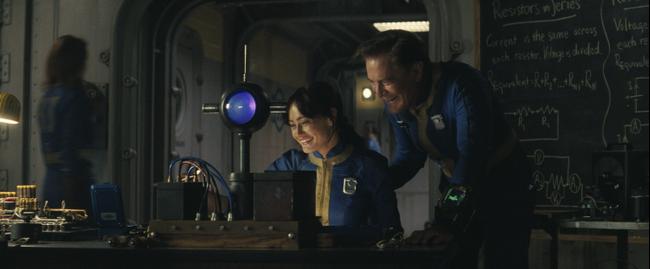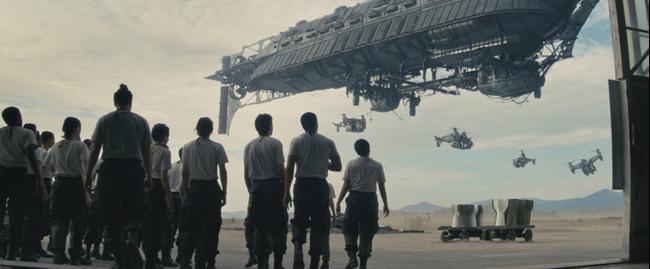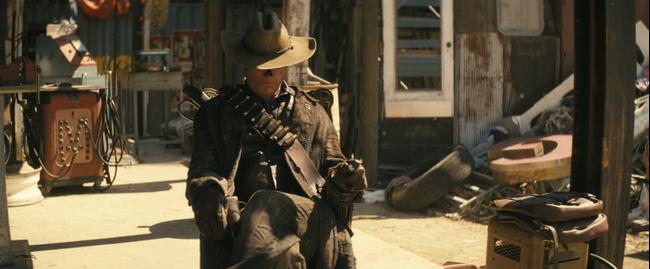
Fallout’s TV debut is a delight for fans - but better still, it stands tall alone - review
It’s sort of crazy that so few of the big-budget video game adaptations are of role-playing games. Yeah, we’ve got a couple of Final Fantasy movies of varying quality, a pretty middling Warcraft film, quite a few animes, and Pokemon of course - but considering we’re such a story-driven medium, it’s sort of crazy how few RPGs have been given the Hollywood adaptation treatment.
In that sense, Fallout might be the biggest and most important video game adaptation for this plucky genre-specific website and its ravenous audience of RPG nerds. As a first in the RPG space… this is a pretty good signal. I’d expect we might even see a few more RPGs get adapted in this way. Why? Well, because Fallout’s TV debut is pretty damn excellent.
The single most important thing to signal about Prime Video’s Fallout is this: it will work for you and whoever you want to watch it with. If you’re reading this website, it’s a safe assumption that you’re a Fallout fan, or at the very least are aware of the basic conceits and setup of the series. For you, the show will work - it’ll reward your fandom and tickle your sense of nostalgia for the games, be that truly old school or more recently-formed.
But better still, it’ll work even if you’ve never played Fallout. In fact, I dare say the series will convert a lot of non-fans. If you’ve a partner or a friend who isn’t a fan of the series or even a gamer, this show stands every chance of working for them, too. This is something many game adaptations have struggled with - but the barrier to entry on Fallout is as low as it could be. Prior knowledge isn’t assumed - but it is keenly rewarded, as there’s much for existing fans to latch on to.

The reason prior knowledge will be additionally rewarding is down to one canny choice on the part of the show’s licesors at Bethesda and its producers at Amazon MGM Studios – that being that the entire show is canonical to the video game series. All of this is part of the same unbroken continuity that gamers have been experiencing since 1997.
The result should provide fans with a thrill; as the latest-occuring story in the Fallout timeline up until now, the show’s stand-alone and self-enclosed narrative nevertheless offers hints about the status of organizations and places fans will recognize from the games. You’ll learn what’s shifting in the world, and even the fate of some specific locations that were last visited in the first two titles in the series some twenty-five years ago.
It’s sufficiently disconnected that the show isn’t concerned with following up on anything from the older games in-depth, but connected enough that fans will inherently get a little more out of this story and feel like it matters more to their existing fandom than some faithful retelling or separate continuity. Things that occur in this show are likely to eventually have repercussions in Fallout 5, even if they’re only minor.
In fairness, Fallout lends itself to this setup. Each game is discrete enough - and so the show follows the same structure. A new location, a new vault, and a selection of new protagonists, antagonists, and deuteragonists. The opening of the show is completely in line with games: a short window into the world before the bombs fell, then a smash cut forward to life in the relative ‘paradise’ of a Vault-Tec bunker. Slowly, events unfold that will force the capable but naive Lucy (Ella Purnell) out into the wasteland - and to learn what became of the world.
Structurally Lucy is the show’s main protagonist, but the lead spotlight is actually shared with Maximus (Aaron Clifton Moten), a member of the Brotherhood of Steel, and The Ghoul (Walton Goggins), a famous actor before the bombs fell who is still rattling around two centuries later as a gunslinging irradiated bounty hunter. The three cross paths, their stories intertwining and unraveling as the show’s mysteries are revealed.
The choice to go with three relatively equal-footed protagonists is a genius move, even as it sometimes stretches the show’s pacing a little thin. That can be forgiven, though, as all three are boundlessly charismatic. Goggins is an inspired casting choice, impossible not to love even as he commits hideous violence. For newcomers, his character is key to understanding the beauty and horror of the wasteland; he is complicated in the same way the world itself is.
Lucy and Maximus are less complicated - young and sheltered by their upbringings, they are then forged in the fire of the ‘real world’. Lucy is a particular triumph - somehow full of an energy that feels spot-on for a Fallout lead. She sells the sort of madness that an ‘average’ Vault Dweller finds themselves mixed up in. In the games, you sort of accept the escalating madness and abilities as just a conceit of video game role-playing - but the series manages to make a similar arc within a more grounded and realistic-feeling character.
One thing that surprised me in general is how much the narrative feels like it hits the ‘points’ of a Fallout game’s story. The moment of leaving the vault, and madness within the vault, feel incredibly true to the last few games. In one detour, Lucy ends up in the ruins of an old Super Duper Mart store with scavenger types - and it just feels like one of the side quests from the games. For her, it exists in the same context, too - it isn’t part of her ‘main quest’, but it’s a test of her character and a turning point in her understanding of the Wasteland - and what she’ll need to do to survive it.

Come the back end of the narrative, that feeling of similarity to the games holds. There’s big verbal confrontations, factional jostling, and a small, unknown person ultimately playing a huge role in the future of the Wasteland. It feels honest. It feels right. Some, I imagine, will criticize the show for perhaps being too low-stakes. At its heart, until the eleventh hour, this is primarily a story about a family despite the apocalyptic scale. But again, to me - that's Fallout. This has always been a series not about the big, bombastic war - but about the smaller stories of those left behind in its wake. Again, the show feels true to that.
Many gaming conversions have nailed the superficial, surface-level representations of the world they’re adapting - but few really get this feel right. When they do, it has sometimes come at the cost of being a good movie or TV show. Here, the creators of this Fallout story have somehow threaded the needle - it feels authentic and true to the games not just visually, but tonally and spiritually - but it absolutely works as a killer piece of television.
All of this isn’t to say that the show is perfect. The first couple of episodes feel a bit draggy in the middle and initially had me a little worried about the rest of the show. Episode 1 and 2 form a sort of two-part introduction to the world; the needle drop of de facto Fallout theme tune ‘I Don’t Want To Set The World On Fire’ is held back for the end of the second episode rather than the first - a subtle indication that is when the ‘true’ journey of the three protagonists begins.
That trio is part of the struggle of the first few episodes, in fact - there’s a hell of a lot to set up. I wonder, in a way, if it might’ve been structurally better if the first episode had been all about Lucy and the second all about Maximus, rather than cutting between them for two hours. But by the end of episode two the momentum picks up pace in earnest and doesn’t let up until the show’s satisfying but second season teasing conclusion.

The show’s score also left me a little cold. Inon Zur has done a fabulous job giving Fallout a new musical identity in the franchise’s Bethesda era - and though the TV series composer Ramin Djawadi does channel and even sometimes directly reference Zur’s work, I honestly don’t think Djawadi’s effort matches the work on the games.
Similarly, I think there are a couple of occasions when the show eagerly attempts to channel things like the VATS system’s slow-mo gore, that feel more than a little too twee for even Fallout’s tongue-in-cheek world when ported over to live action. It’s also in some of these moments when the generally lush looking show, which matches the apocalyptic vibe of the games with ease, occasionally feels a little on the cheaper side.
These are nitpicks, though. The ultimate point is that I finished this show and felt my fandom and affinity for the Fallout series only deepen - and I’m somebody who has loved this franchise since the nineties. It’s respectful, it’s authentic, and it’s a good TV show in its own right. I watched it with my partner - not really a gamer and certainly not the type that plays large-scale RPGs like Fallout - and she also enjoyed it, though from a different perspective. She was enthralled by the weird, quirky, silly-but-grim world of Fallout for the first time - which is arguably the most important thing a show like this can do.
Fallout is worthy of its name. It’s also one of the best video game adaptations to a live-action medium ever achieved.